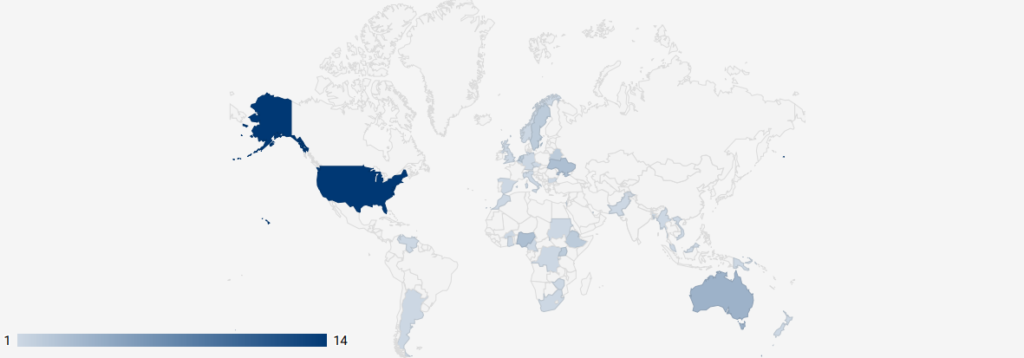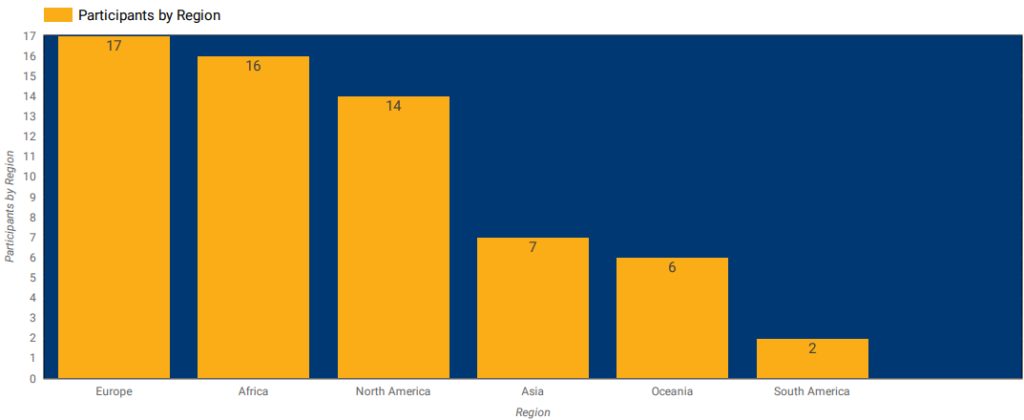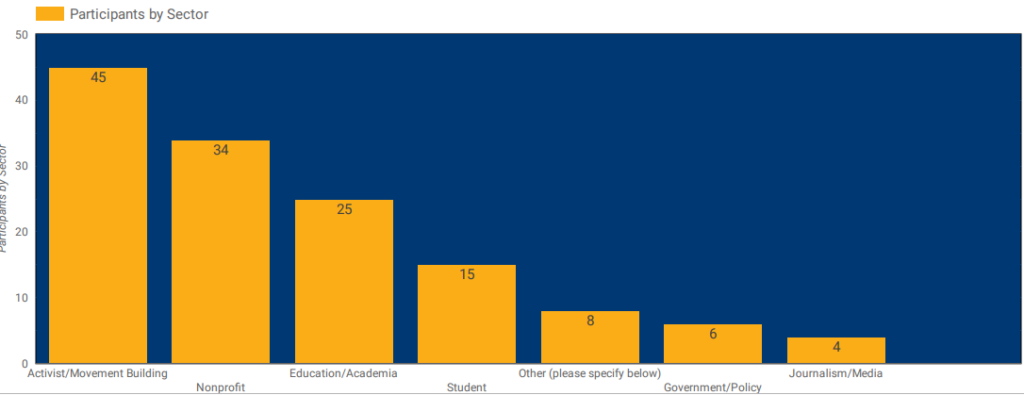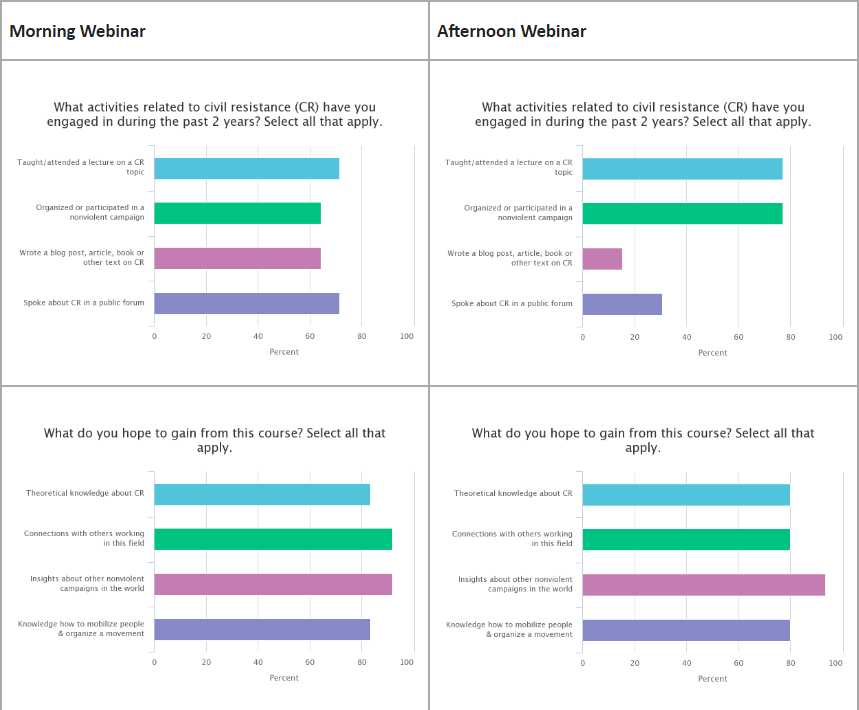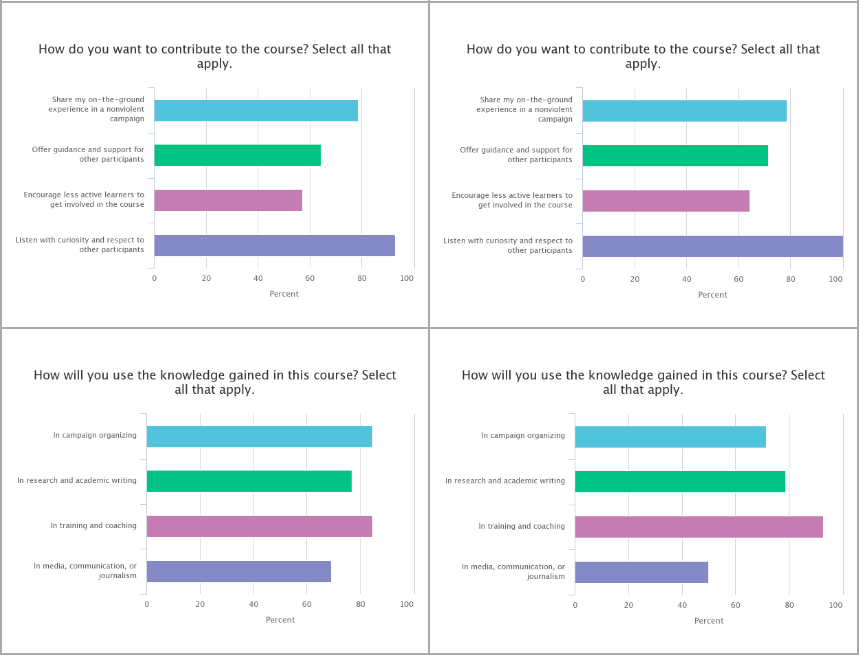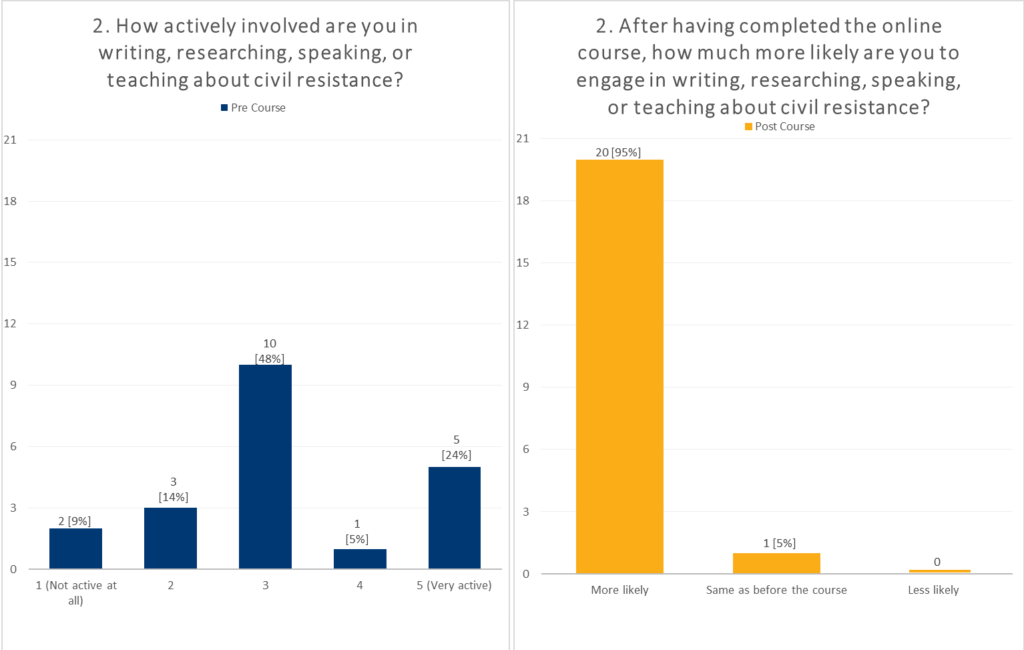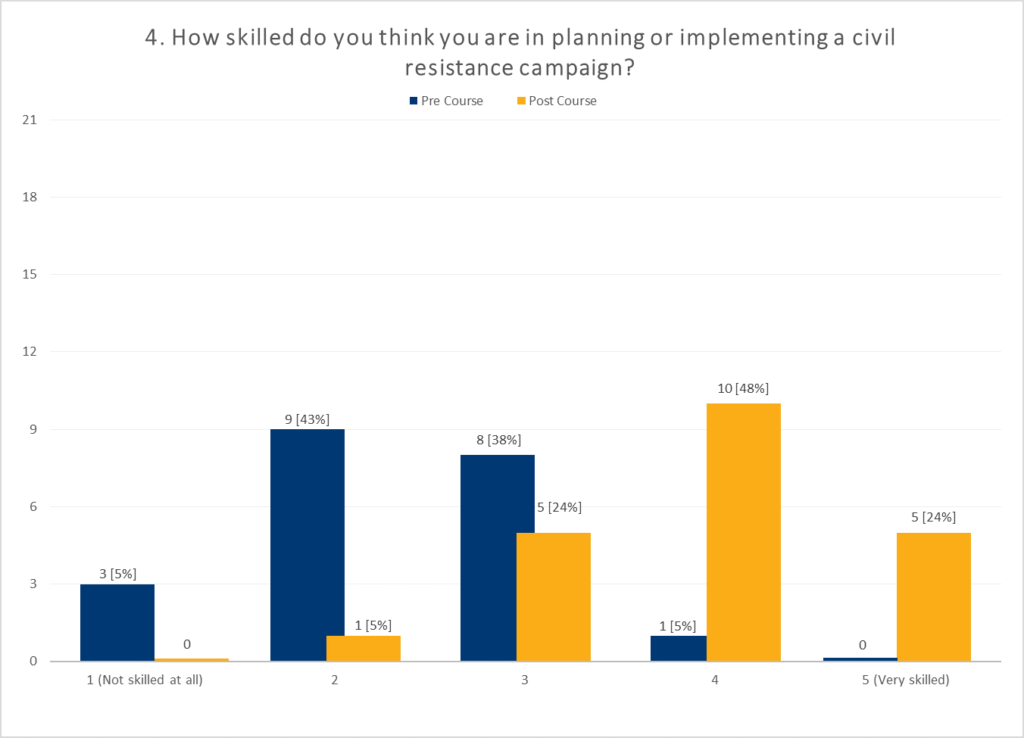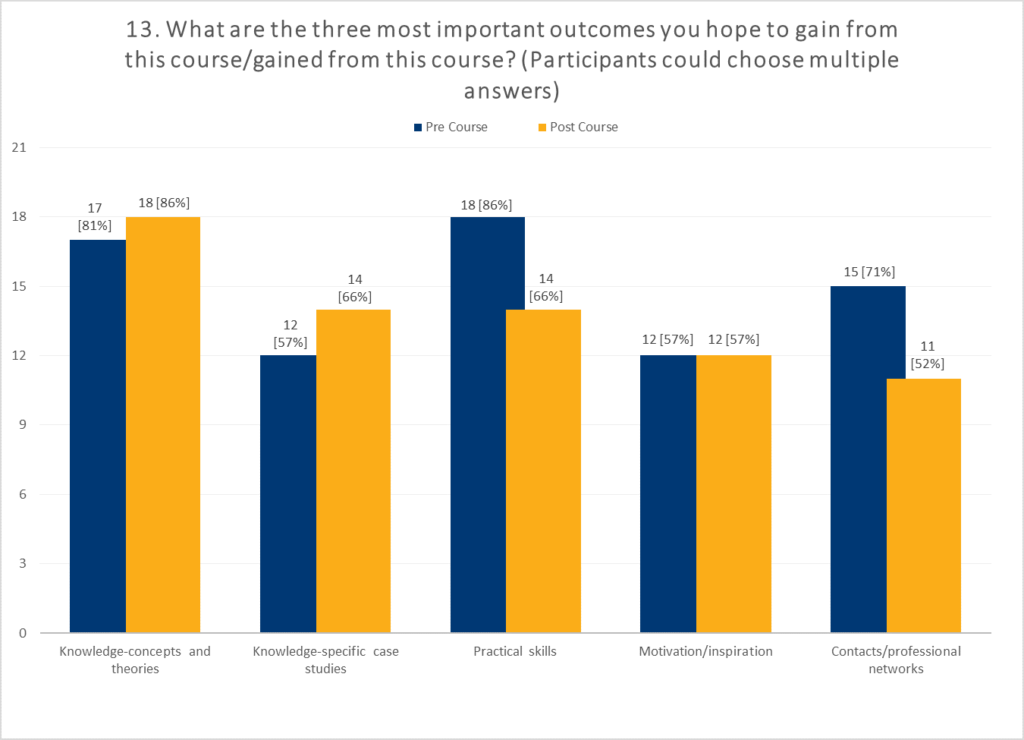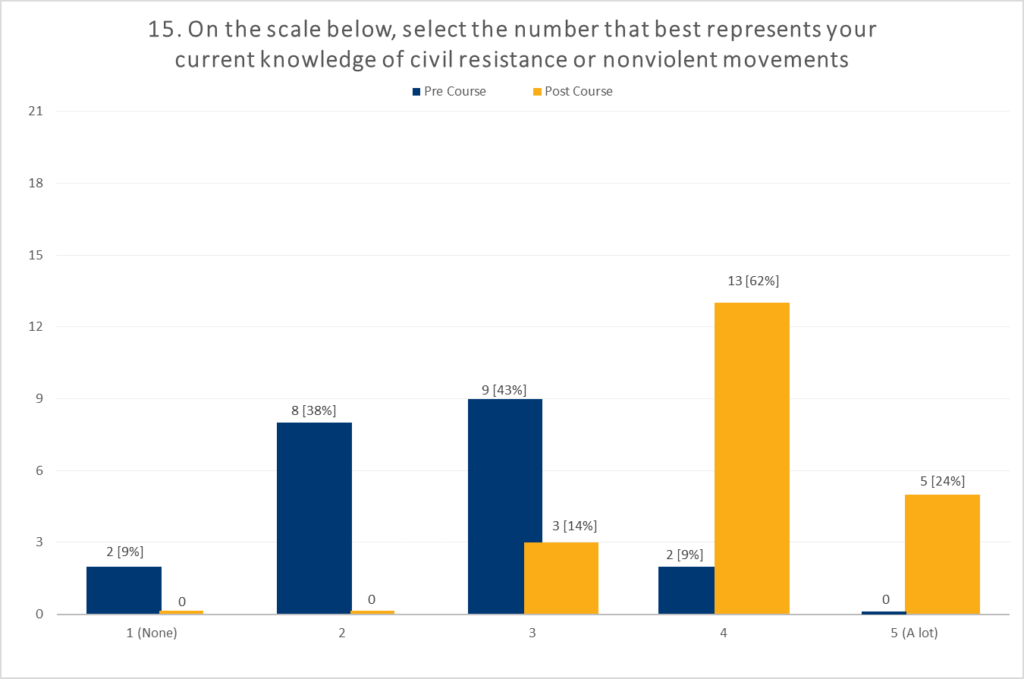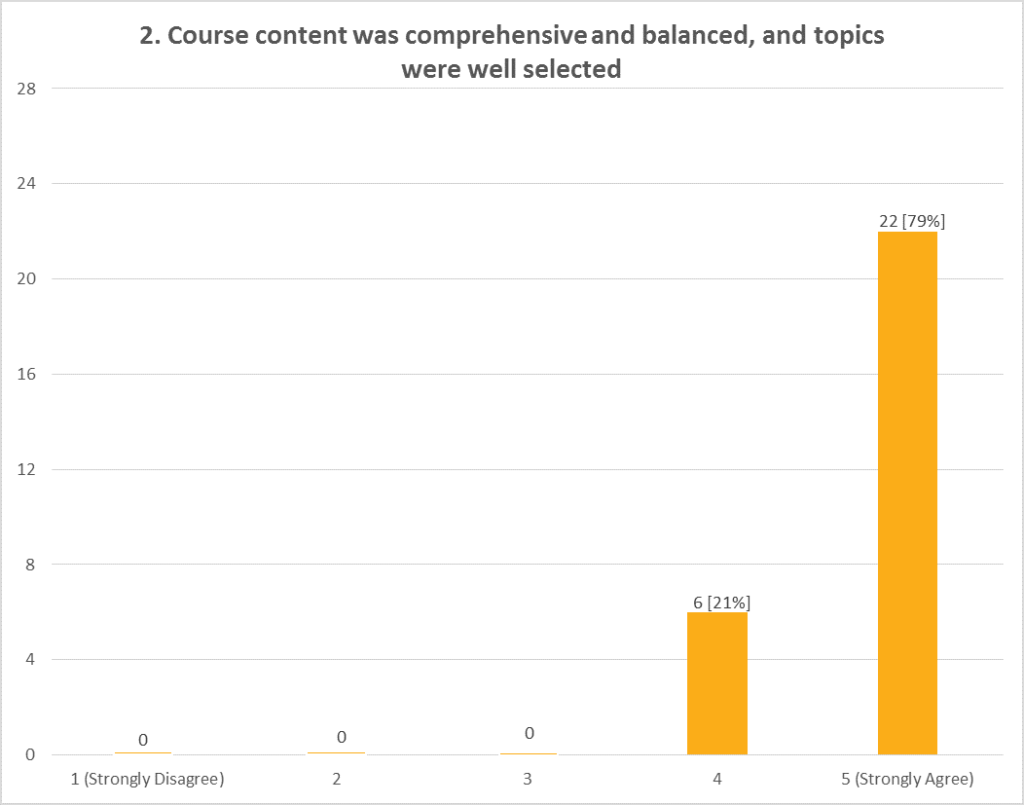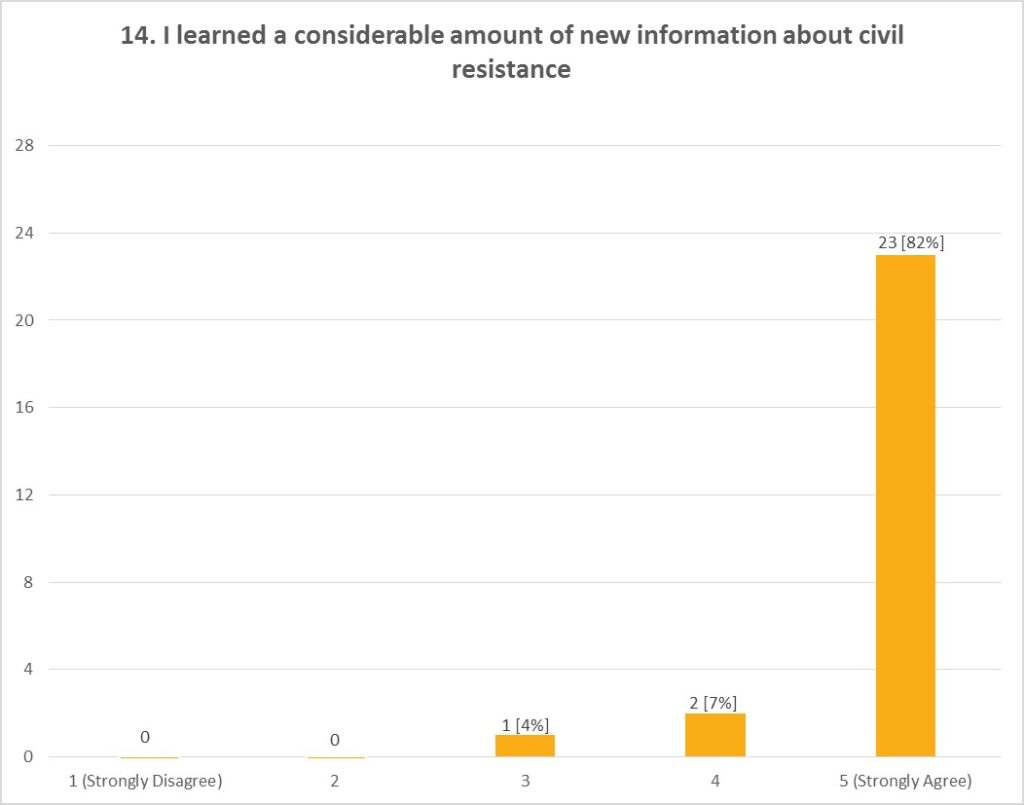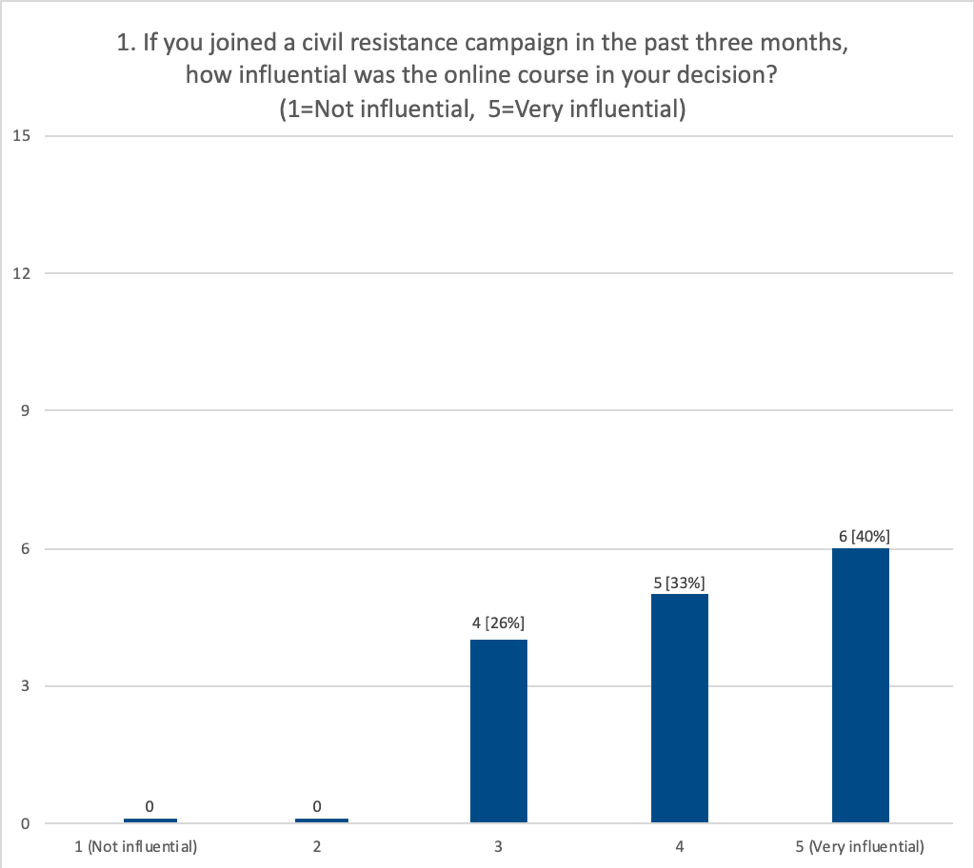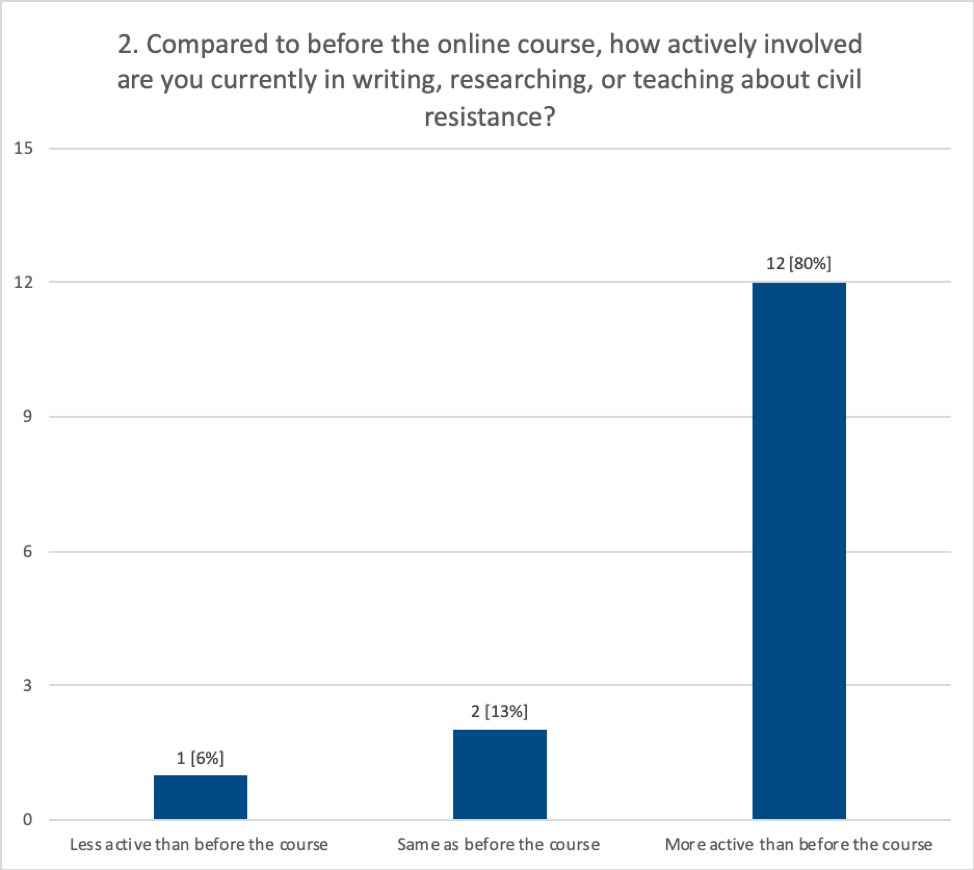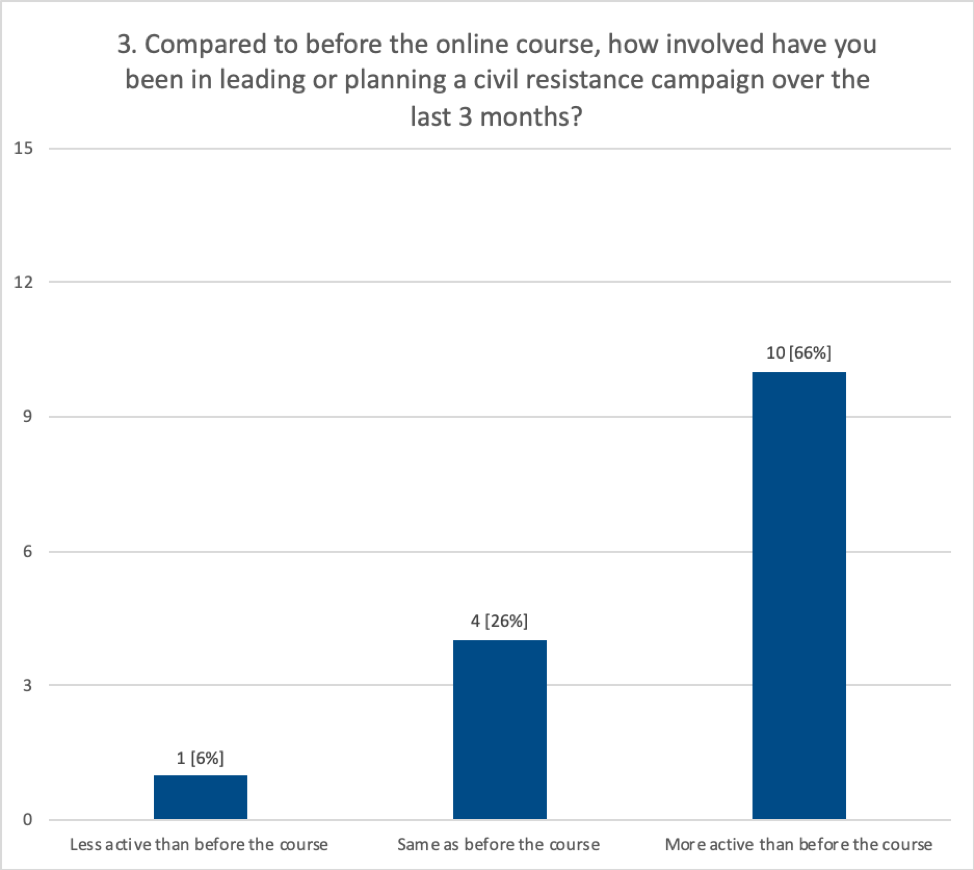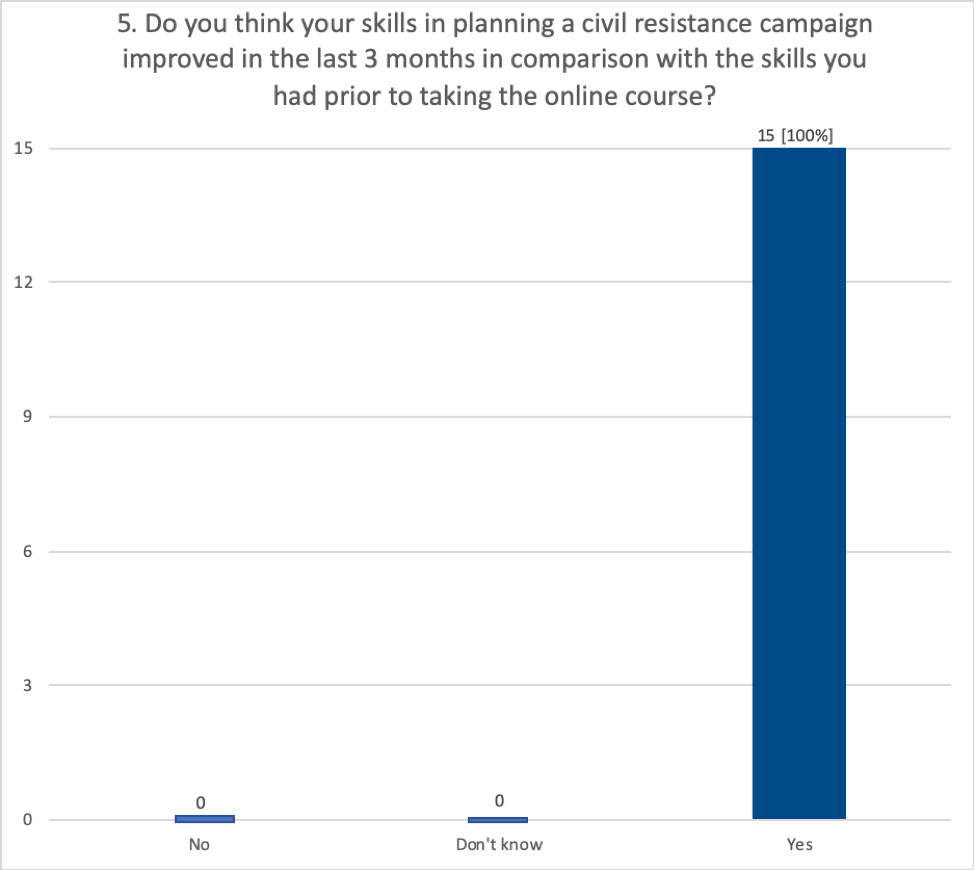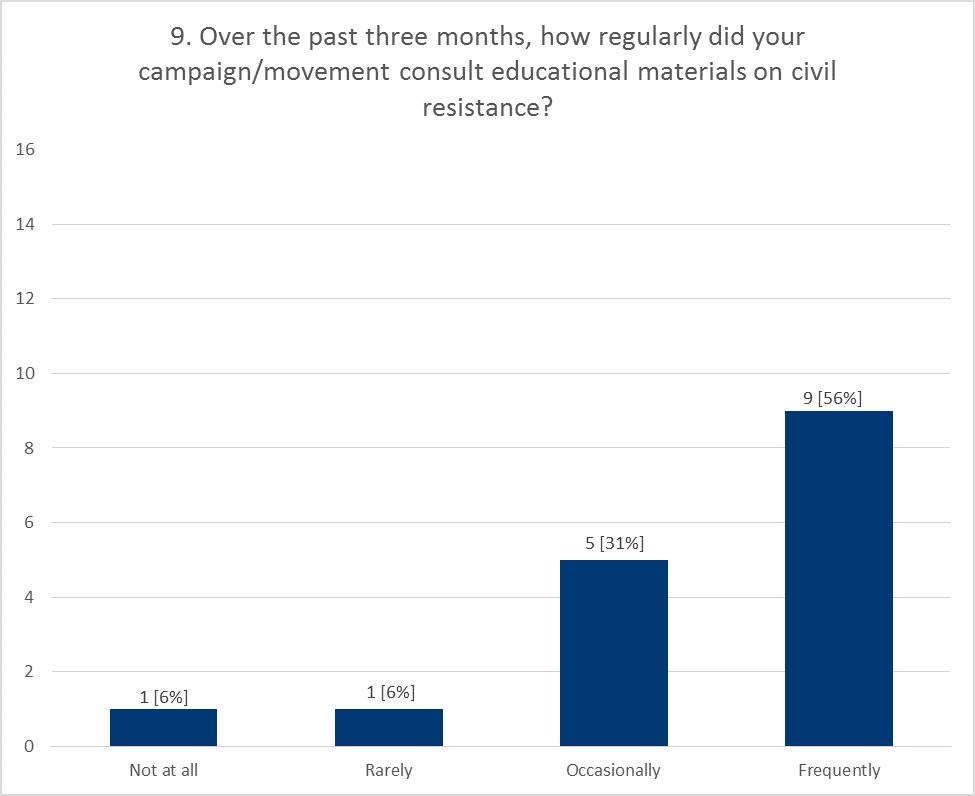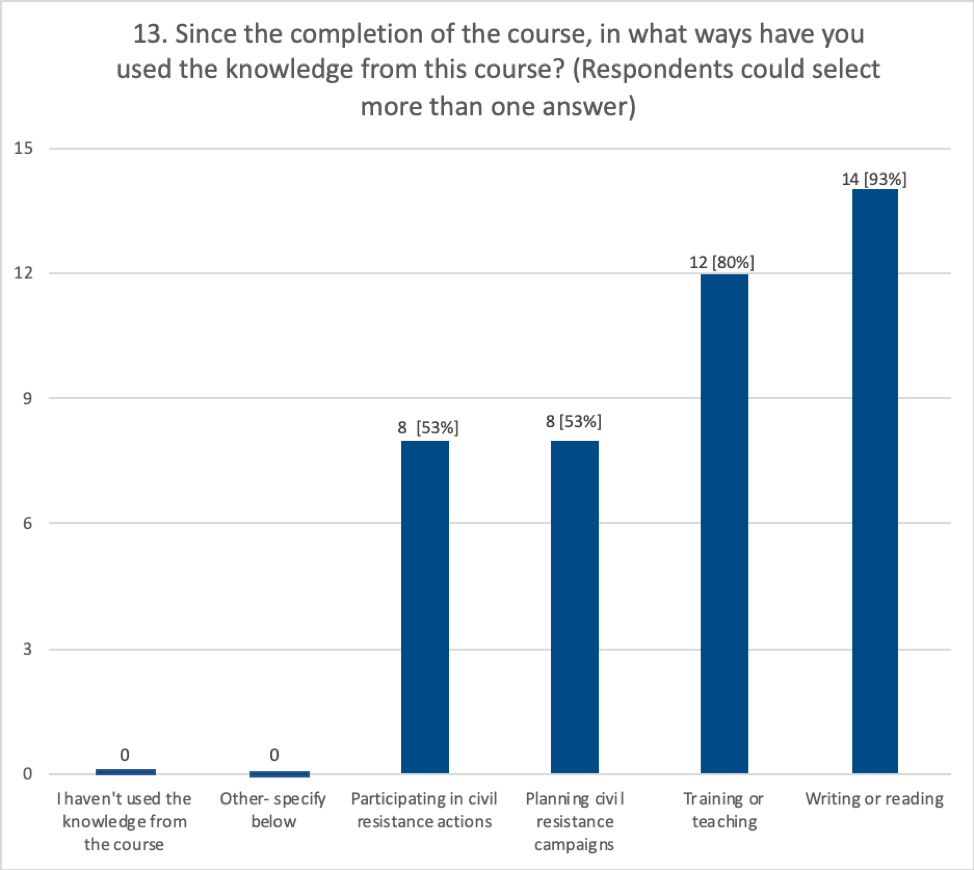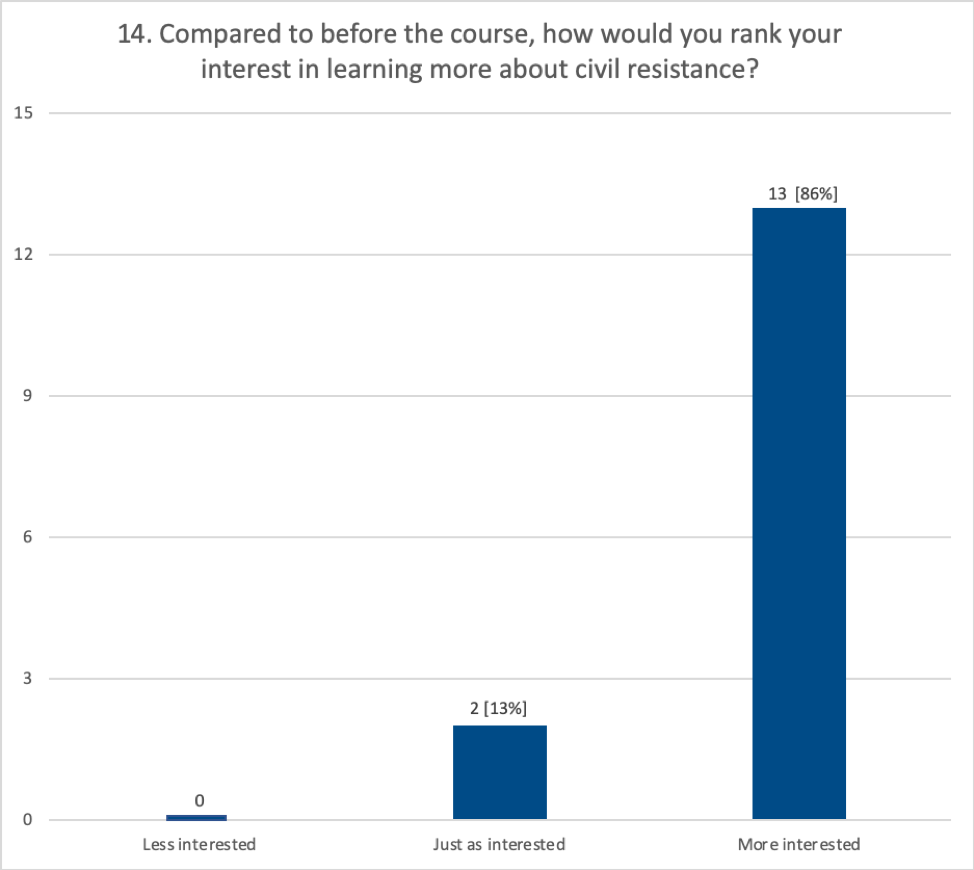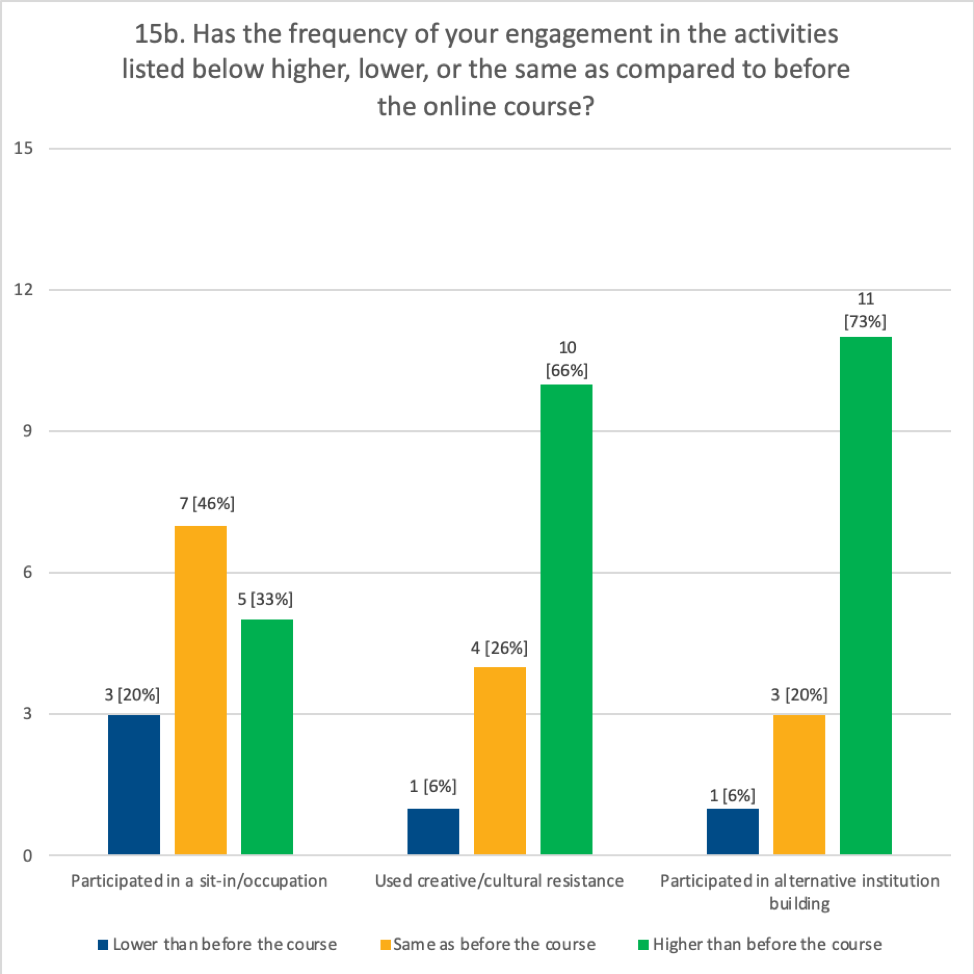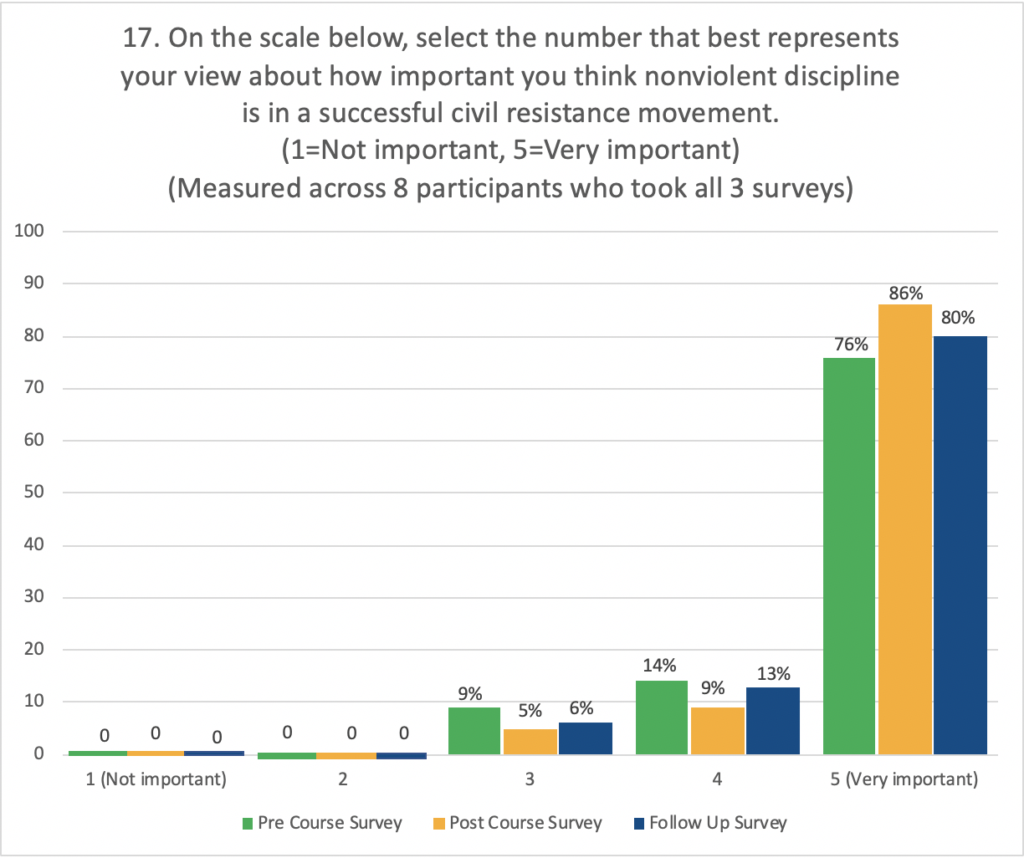2019 Participant-Led Online Course Assessment
 For the third year, ICNC offered our popular participant-led online course: “Civil Resistance Struggles: How Ordinary People Win Rights, Freedom, and Justice” from February 7th to March 29th, 2019.
For the third year, ICNC offered our popular participant-led online course: “Civil Resistance Struggles: How Ordinary People Win Rights, Freedom, and Justice” from February 7th to March 29th, 2019.
Read more about the 2019 course and review the assessments below.
You can also view assessments from previous courses in 2018 and 2016-17.
Applications, Admission and Course Participants
ICNC received 131 applications for the participant-led online course. The quality of applications was high and it took several rounds of reviews to select the 62 participants who were invited to take part in the online course.
The participants came from a wide range of professional backgrounds and countries, as shown in the graphs below. There were 17 participants from Europe, 16 participants from Africa, and 14 from North America.
Participants came from a wide range of professional backgrounds. Participants could select multiple answers when responding to this question on their course application. 45 participants self-identified as Activist/Movement Builders, 34 participants self-identified as working in the Nonprofit sector and 25 participants were involved in Education/Academia, either as students or faculty.
Before the course began, ICNC hosted two orientation webinars for course participants. Each orientation webinar contained survey questions asking participants what they hoped to gain from the course.
In summary, participants indicated that they wanted to:
- gain practical knowledge on how to organize civil resistance campaigns more effectively,
- learn about general dynamics, concepts and cases of civil resistance, and
- share their own personal experiences with others in the course.
Course Structure & Content
Due the nature of the participant-led course, ICNC did not provide live moderation. However, ICNC staff provided:
- Comprehensive curriculum on civil resistance, meaningful videos and readings, discussion forums, group exercises, and resources for further learning
- Technical support
- Course announcements & updates

One of the unique features in the participant-led course was a self-learning community. Participants in the course built this community based on the following four principles:
- Active participation via careful content review & engagement in the forums and small group work
- Respect for different views and collaborative dialog
- Educating each other via constructive feedback, sharing relevant information, stories, and ideas
- Mutual assistance: checking on your colleagues that lag behind and are silent, offering help where needed
Course participants also had access to the ICNC Mobile App, which is available on iOS and Android. By using the app, participants could download the course content and access it offline when they were travelling or if they were in areas with low internet access.
Module 1. Introduction to the Course
In the welcome module, we laid out the objectives of the course. We discussed course activities, including forum posts, recorded webinars, readings, videos, webinar meetings and online discussions. We provided online learning tips to help participants make the most of the online learning experience. Finally, we introduced participants to the People Power Game: A Strategic Game About Civil Resistance, a video simulation that participants play throughout the course, during which the player takes on the role of a strategic planner for a nonviolent movement.
Module 2. Foundations of Civil Resistance
In this session we laid the theoretical groundwork out of which this field has grown, digging into both data and the big picture. Virtually every day, somewhere in the world, there are people engaging in civil resistance. But what do we mean by this term? Do we all understand it the same way? How is civil resistance defined and spoken about in participants’ towns, communities, regions or countries? In this session we clarified the concept of civil resistance, looking into power that underlies people’s actions and considering the track record of civil resistance over the past 110 years, including the reasons behind its effectiveness. This module aimed to equip participants with data to share with others in their networks about the effectiveness of civil resistance, and to enable them to articulate what civil resistance is in a clear and concise manner.
Module 3. First Small Group Project: Movement Media Strategies
In this module, participants were organized into nine different small groups and tasked with several group assignments. They watched an ICNC video on the effectiveness of various media strategies and discussed their thoughts and questions with each other in discussion forums. After engaging in an online discussion, participants then held a video conference together. Their work during the module culminated in a group handout with 15 different principles that civil resistance movements can use when creating a media strategy.
Module 4. Strategies and Tactics of Civil Resistance
In this session, participants looked at what strategy in civil resistance is, and how it relates to tactics. We examined examples of different tactics, including cultural resistance tactics, and discuss tactical innovation, including strategic sequencing of tactics that enhance the effectiveness of nonviolent methods and campaigns. Finally, we explored different conflict analysis tools that help movements systematically assess and analyze the battlefield in which they are engaging nonviolently.
Module 5. Repression, Backfire, and Defections
In this session, we started with a discussion about repressive contexts in which nonviolent resistance movements take place, and the phenomenon of backfire when violence against unarmed activists boomerangs back to those who carried out the repression. We explored how civil resistance movements can optimize the impact of backfire and use it to their advantage. How does the side that uses repression aim to hinder potential backfire? We then discussed defections that often, though not always, occur as a result of the backfire effect. This module focused on understanding defections from one group — security forces — and explores conditions under which the defections might happen. It also explored how regimes often try to mitigate the likelihood of security defections, and strategies that movements might deploy to increase chances of loyalty shifts among security forces.
Module 6. Second Small Group Project: Anti-Corruption Campaigns
This module was the second group work module. Participants were given a hypothetical case study and their group assignment was to create an anti-corruption campaign strategy plan. After watching videos and reviewing readings, the groups held online discussions and video conferences to discuss their groups’ campaign plan. They finished the module by creating a campaign strategy plan and sharing their work with the other groups for their review.
Module 7. Finishing the Course
In the last two days of this online course we solicited participants’ views about the course and their learning experience. We asked about their learning progress, overall educational experience, assessment of the course content, interactions in the forums, and their personal engagement during the six-week period. This feedback has allowed us to improve our future online courses and make our teaching pedagogy on civil resistance more effective and more impactful on all learners involved.
Learning Gains Survey Results
At the beginning and end of course, participants were asked to take a survey measuring their knowledge about civil resistance. These surveys contained the same questions, in order to demonstrate the extent of the knowledge that they gained during the course.
the same questions, in order to demonstrate the extent of the knowledge that they gained during the course.
21 participants completed both the pre course and post course survey and selected graphs from their comparative results are shown below.
To see the full results of the Learning Gains surveys, please click here. You can use the links below to navigate directly to each graph.
- How actively involved are you in a civil resistance campaign?/How likely are you to join a civil resistance campaign because of what you learned in this online course?
- How actively involved are you in writing, researching, speaking or teaching about civil resistance?/After having completed the online course, how much more likely are you to engage in writing, researching, speaking, or teaching about civil resistance?
- How skilled do you think you are in planning or implementing a civil resistance campaign?
- What are the three most important outcomes you hope to gain from this course/gained from this course? (Participants could choose multiple answers)
- On the scale below, select the number that best represents your current knowledge of civil resistance or nonviolent movements
- On the scale below, select the number that best represents your view about how important you think strategic planning is in a successful civil resistance movement
- On the scale below, select the number that best represents your view on how successful you think civil resistance campaigns against repressive states have been in the past
Selected Graphs
1. How actively involved are you in a civil resistance campaign?/How likely are you to join a civil resistance campaign because of what you learned in this online course?
Pre course survey:
81% of respondents selected “2” or “3”, showing that they were not very active in civil resistance campaigns.
Post course survey:
81% of respondents said that they were more likely to join a civil resistance campaign, showing that their interest and desire to be more involved had increased during the course.
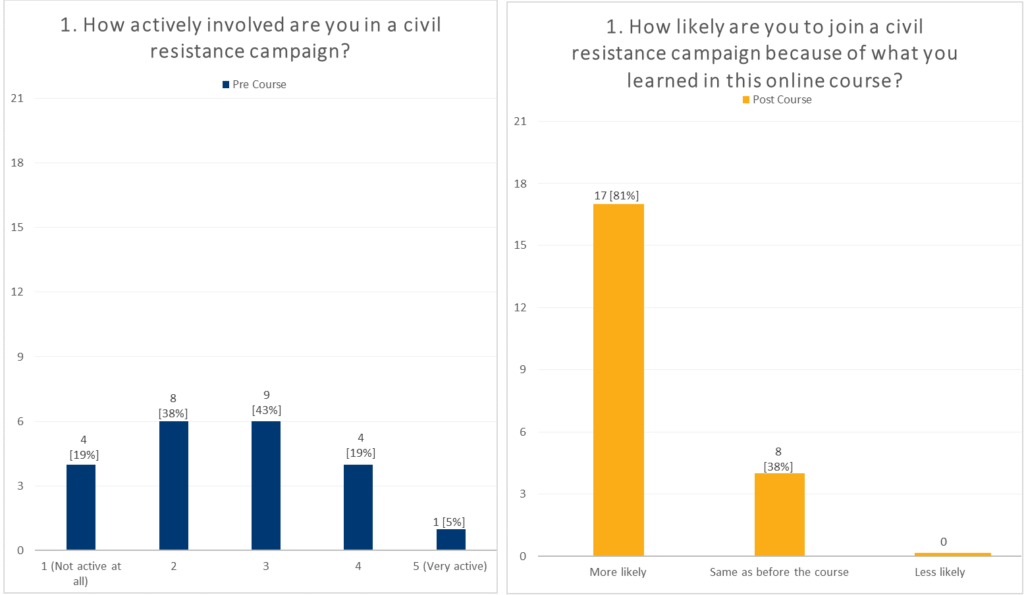
2. How actively involved are you in writing, researching, speaking or teaching about civil resistance?/After having completed the online course, how much more likely are you to engage in writing, researching, speaking, or teaching about civil resistance?
Pre course survey:
62% of respondents selected “2” or “3”, showing that they were not very involved in writing, researching, speaking or teaching about civil resistance.
Post course survey:
95% of respondents said they were more likely to write, research, speak or teach about civil resistance than before the course.
4. How skilled do you think you are in planning or implementing a civil resistance campaign?
Pre course survey:
5% of respondents selected “4” or “5” and 48% of respondents selected “1” or “2”, showing that they thought they weren’t very skilled in planning/implementing a civil resistance campaign.
Post course survey:
72% of respondents selected “4” or “5” and 5% of respondents selected “1” or “2”, showing that after taking the online course, they thought would be very skilled in planning/implementing a civil resistance campaign. None of the post course respondents selected “1” and only one respondent selected “2”
13. What are the three most important outcomes you hope to gain from this course/gained from this course? (Participants could choose multiple answers)
Pre course survey:
86% of respondents wanted to gain practical skills, 81% wanted more knowledge about civil resistance concepts and theories, and 71% wanted to expand their professional networks.
Post course survey:
86% said that they had more knowledge about civil resistance concepts and theories, and 66% said they had more knowledge about specific case studies and more practical skills.
15. On the scale below, select the number that best represents your current knowledge of civil resistance or nonviolent movements
Pre course survey:
9% of respondents selected “4” or “5” and 47% selected “1” or 2″, showing that they had limited knowledge about civil resistance or nonviolent movements.
Post course survey:
86% of respondents selected “4” or “5” and none of the respondents selected “1” or “2”, showing that, after the course, they knew substantially more about civil resistance or nonviolent movements.
24. On the scale below, select the number that best represents your view on how successful you think civil resistance campaigns against repressive states have been in the past
Pre course survey:
72% of respondents selected “4” and “5”, showing that they thought civil resistance campaigns had been successful against repressive states.
Post course survey:
81% of respondents selected “4” and “5”, showing that even more respondents now strongly agreed that civil resistance campaigns had been successful against repressive states.
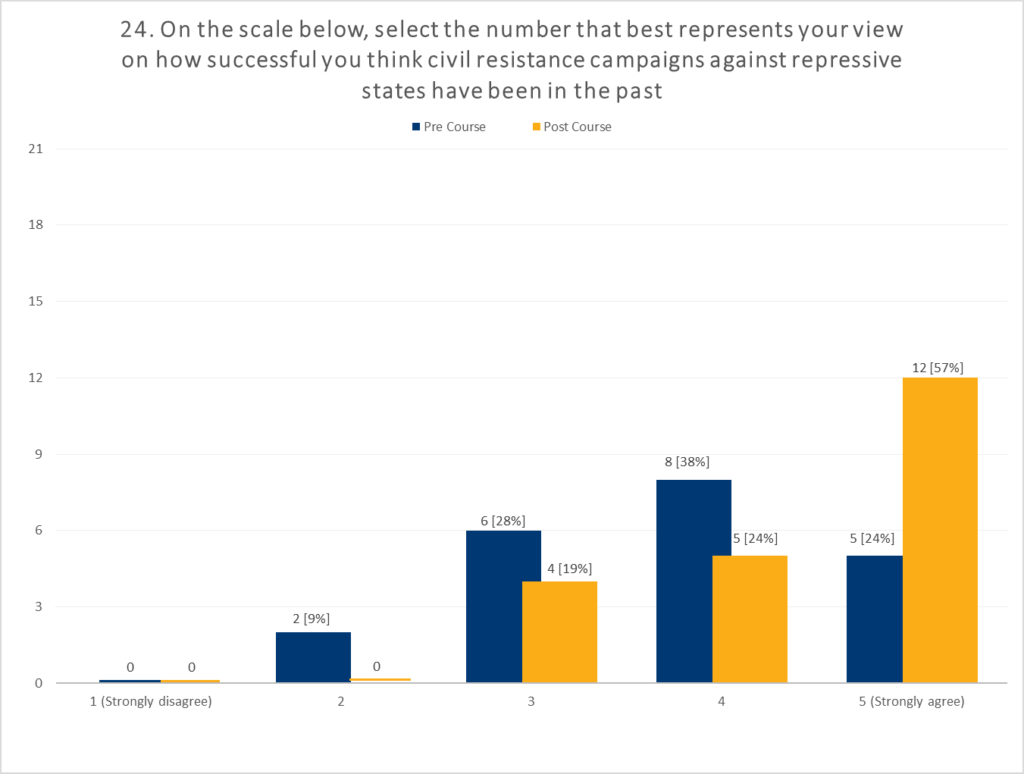
25. On the scale below, select the number that best represents your view about how important you think strategic planning is in a successful civil resistance movement
Pre course survey:
81% of respondents selected “5”, showing that they thought strategic planning was very important in a successful civil resistance movement.
Post course survey:
90% of respondents selected “5”, showing that, after the course, even more respondents considered strategic planning to be very important.
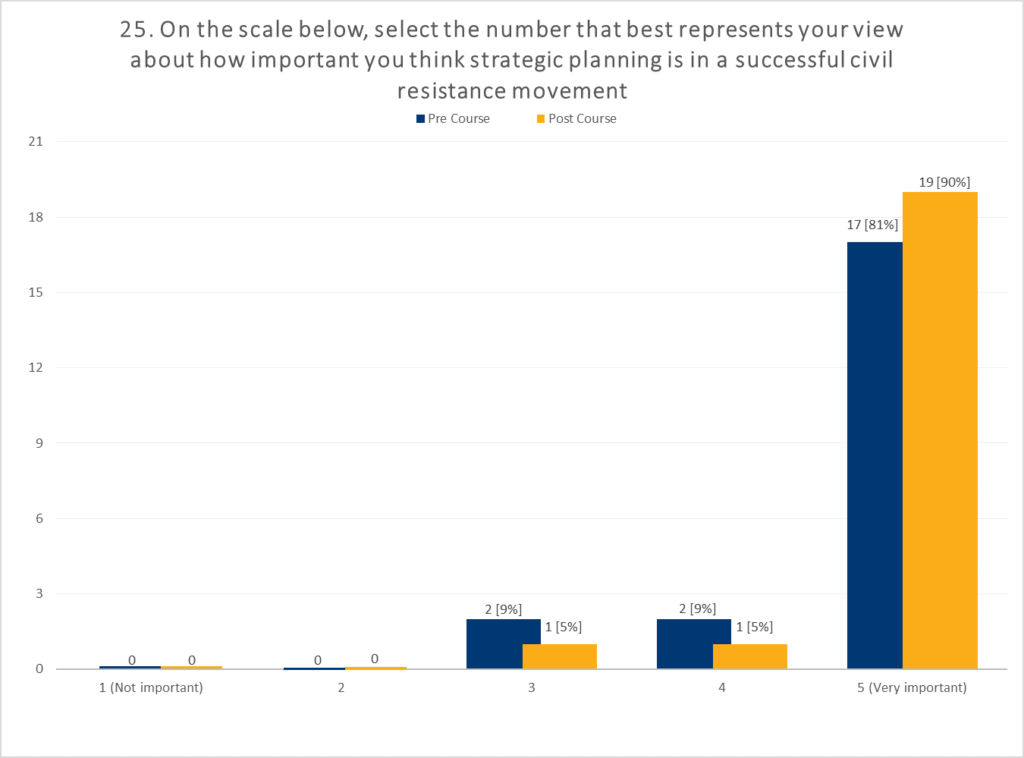
Final Evaluation Results

The participant-led course also included a final course evaluation, in order for participants to provide feedback on the course content, self-learning community, course platform, and more.
28 participants completed the final course evaluation. To see all of the graphs from the final evaluation, please click here. Click on the links below to see the selected graphs for each section.
I. Course Content
II. Group Work
III. General Impression of the Course
IV. Knowledge Gained
V. Self-Learning Community
VI. Applicability
VII. Self-Assessment
VIII. Technology
Selected Graphs
 2. Course content was comprehensive and balanced, and topics were well selected
2. Course content was comprehensive and balanced, and topics were well selected
100% of respondents selected “4” or “5”, and no one selected “1”, “2”, or “3”, showing that all of the respondents either agreed or strongly agreed that the course was comprehensive and well balanced.
10. Please describe your overall experience with the group work. Were there any particular parts of the group exercise that you found especially helpful for engagement & learning or/and challenging and why?
- “The group module on strategies against corruption regimes was interesting as participants were able to share perspectives based on experience in their countries.”
- “I loved the video meetings, and I loved that specific requirements were given for how the groups needed to connect because that made it so much easier to bring the group together!”
- “I enjoyed learning with/from other peers who have different background and experiences. Nevertheless, it was challenging to coordinate online meetings. They sometimes ended up with some members doing all the work, while the absent ones still getting credit for a “group project” in which they did not contribute.”
- “I regretted that some group members were not really involved in the group assignments when it was about contributing ideas and inputs. If all had participated actively and seriously, the experience would have been even wonderful and the learning would have been highly enriching.”
III. General Impression of the Course
12. I would recommend this course to other people
97% of respondents selected “4” or “5”, showing that they agreed or strongly agreed that they would recommend the course to other people. None of the respondents selected “1” or “2”.
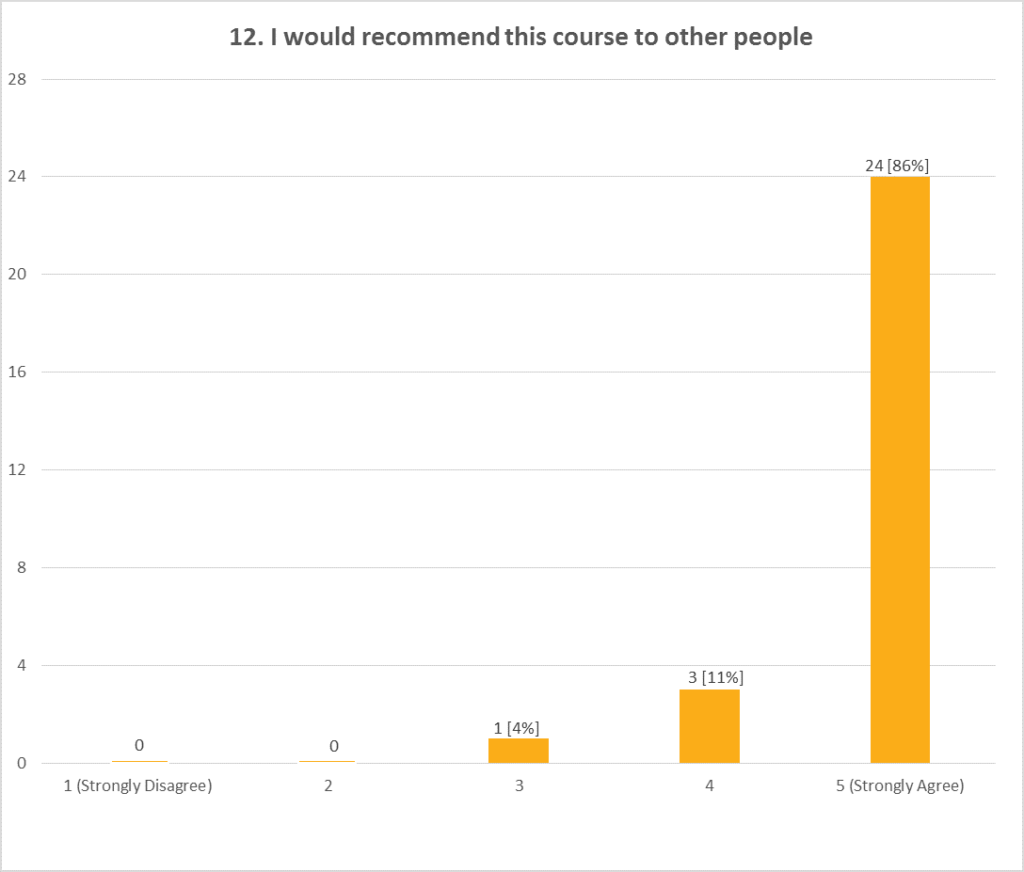
14. I learned a considerable amount of new information about civil resistance
82% of respondents selected “5”, showing that they strongly agreed that they had learned a considerable amount during the course. None of the respondents selected “1” or “2”
18. What did other course participants do that was helpful to your learning and engagement with the course content? What advice would you give other course participants?
- “The diversity of the participants drove home to me the idea that freedom is yearned for globally”
- “I appreciated participants talking about the movements they had been involved in or the contexts where they were coming from. Speaking with international participants was fantastic.”
- “It was highly constructive for me to go through other participants comments in the discussions. I could learn about their experiences and perspectives on specific topics. I would therefore advice others to go the extra mile by not only writing constructive comments about their own experiences, but also taking the initiative and go through other’s comments and leave them feedback where possible.”
- “I enjoyed the comments of course participants on my posts and also benefited from their personal stories of using people power in their environments.”
21. The knowledge I gained from the course will be relevant in my current and future study/work/activities
97% of respondents selected “4” or “5”, showing that almost all of them agreed or strongly agreed that the knowledge from the course would be relevant in their current and future educational or professional activities.
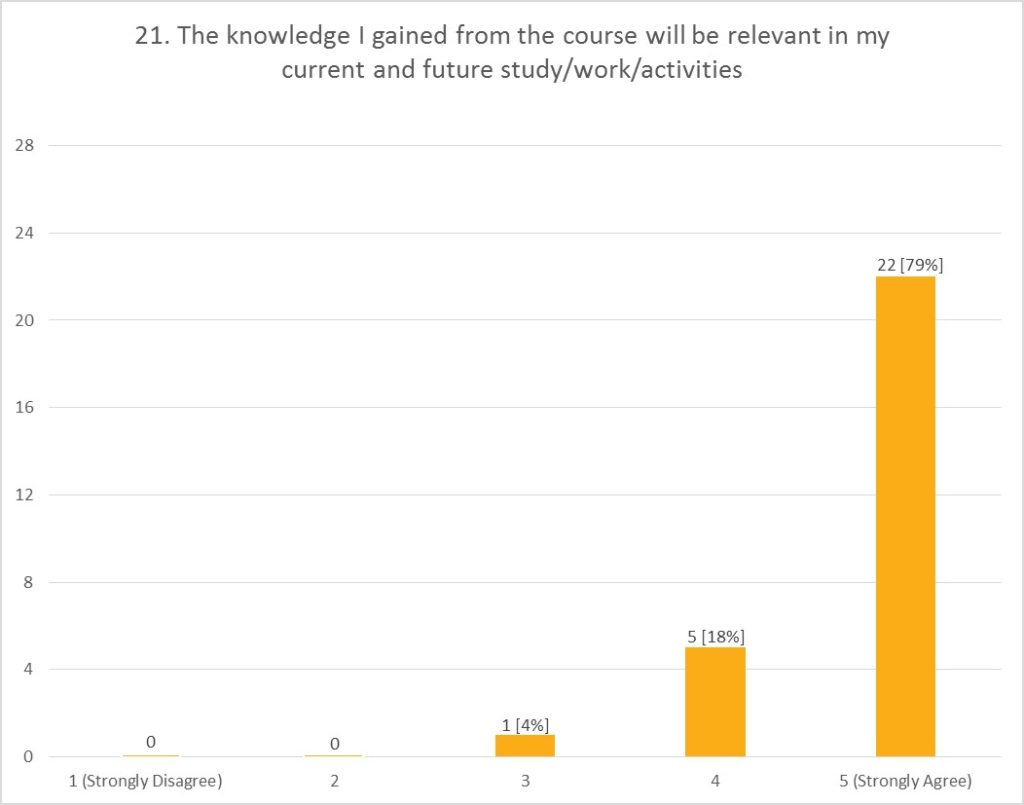
23b) If you kept up with the pace of work and your participation met your course commitment, what tips would you share with future participants about how you managed the course load, engagement with the material, and participation in the course forums?
- “Plan daily schedules between your work and availability of internet connection. Allocate your free time for the online course”
- “It does seem a bit busy to work and pursue learning. I decided to write down what I planned to do each day of the week. I tried to ‘put first things first’ to recognize high priority issues and allocate adequate time for each tasks”
- “I think it is important to commit one hour per day 5 days a week and go to the discussion forums the minute you finish the material required. After that, check the forums for a few days to see what others have posted”
- Make good use of the mobile app if you have a smart phone. Once a module is open, make sure to read the first instructions and at least begin watching a video and reading part of a text. You can also just download it. This action makes it easier to follow the course instead of having to wait and read the assigned texts, watch the videos and engage in forum discussions at the last minute just to finish the module”
25. What was your overall experience with the online course web platform and the ICNC mobile app?
- “I enjoyed the mobile app as it is. It was very helpful when I was in the public bus and could still access the course”
- “It was, in general, very good. Almost no problem and when there was, it was diligently solved”
Follow-Up Survey Results
Three months after the 2019 ICNC participant-led course ended, the participants in the course were asked to complete a follow-up survey. There were 15 total respondents total, 8 of whom had completed the pre and post surveys as well.
Included below are select results of the follow-up survey. To see the full results of the follow-up survey, please click here. You can use the links below to navigate directly to each selected graph.
1. If you joined a civil resistance campaign in the past three months, how influential was the online course in your decision to do so?
40% of respondents stated that the online course was very influential in their decision to join a civil resistance campaign after course.
2. Compared to before the online course, how actively involved are you currently in writing, researching, or teaching about civil resistance?
80% of respondents are more actively involved in writing, researching, or teaching about civil resistance than they were before the course.
3. Compared to before the online course, how involved have you been in leading or planning a civil resistance campaign over the last 3 months?
66% of respondents are more actively involved in leading or planning a civil resistance campaign than they were before the course.
5. Over the last 3 months, do you think that your skills in planning a civil resistance campaign have improved in comparison to your skills prior to taking the online course?
100% of respondents think that their civil resistance campaign planning skills have improved since taking the online course.
9. Over the past three months, how regularly did your campaign/movement consult educational materials on civil resistance?
56% of respondents reported that their campaign/movement frequently consulted educational materials on civil resistance.
11. Please provide us with a brief description of a civil resistance action within the last three months that your campaign/movement considered to be successful. In what ways, if any, did the knowledge gained from the online course impact the action’s success?
- “I organized a peaceful march for the release of political prisoners in Cameroon. The media and communication strategy proved every effective in winning over especially the print press to report on the movement’s goals. This attracted many volunteers and increased public turnout during campaign days.“
- “A crooked local leader was allowing prohibited beverages to be sold in the village where I live. This situation was creating chaos and drama in the community, with drunk men unable to work, spending their entire days sitting in bars, fighting, stealing people’s items and many other unlawful acts. We organized the community to hold sit-ins at the sector office and sent a letter to a local politician. He saw a letter we sent him and met some representative of our community. Owners of the bars were arrested and jailed. The crooked local leader is now subject to an arrest warrant”
12. Please provide us with a brief description of an educational training/workshop within the last three months that your campaign/movement considered to be successful. In what ways, if any, did the knowledge gained from the online course impact the training/workshop’s success?
- “We have a project on strengthening the capacities of new generations on active nonviolence and entrepreneurship in DR Congo. This project trains young people from different movements, universities and secondary schools on active nonviolence and entrepreneurship. It is a project that will last three years and we plan to train more than 1000 young people in eastern DR Congo. Our slogan is: ‘active nonviolence: A life, a Spirit, a force, a force of the soul’.”
- “Election workshop for the 2019 General Elections held in Nigeria (February and March). I used the knowledge acquired from the online course to educate the electorate on the importance of violence free election and the need for mass participation of voters in order to prevent bad politicians from winning election.”
13. Since the completion of the course, in what ways have you used the knowledge from this course? (Participants could select more than one answer)
53% of respondents have used their knowledge from the course in planning nonviolent campaigns and 80% have used their knowledge in training or teaching about civil resistance.
93% of respondents used their knowledge in the course in writing or reading about civil resistance.
14. Since the completion of the course, how interested are you in learning more about civil resistance?
86% of respondents are now more interested in civil resistance after taking the online course.
15b. Is the frequency of your engagement in the activities listed below higher, lower, or the same as compared to before the online course?
73% of respondents are more frequently engaged in alternative institution building than they were before the course.
66% of respondents are more frequently engaged in cultural resistance (music, art, humor, etc.) than they were before the course.
17. On the scale below, select the number that best represents your view about how important you think nonviolent discipline is in a successful nonviolent movement (1=Not at all, 5=Extremely important)
In the pre course survey, 76% of respondents believed that nonviolent discipline was very important in a successful nonviolent movement.
In the post course survey, that number had increased to 86% of respondents believing that nonviolent discipline was very important.
That percentage was nearly the exact same in the follow-up survey, as 80% of respondents selected that nonviolent discipline was very important.
Selected Testimonials
- “Before I took this 6 week participant led course, I had a lot of doubt about the success of nonviolent resistance from the practical context of my country. I am now a full convert and believe that it can be successful!”-Anonymous, ICNC Participant-Led Course 2019
- “This is the course to take if you are curious about civil resistance and how to use it to champion social justice. The course challenged me to be more comfortable about engaging and leading civil resistance movements for social good.”-Emmanuel Awine Anyorikeya, ICNC Participant-Led Course 2019
- “This course is amazing. So happy I took it! I will have this knowledge forever and be able to contribute in ways that were not possible prior to being in the course!”-Anonymous, ICNC Participant-Led Course 2019
- “This course gave me profound conceptual and theoretical knowledge about civil resistance. I learned about how the success of nonviolent movements is much larger than violent ones, which I never imagined it would be.”- Abdi S. Omar, ICNC Participant-Led Course 2019
- “This is more than just a course, it is an experience that awakens one’s consciousness to the boundless influence that nonviolent resistance can exert. It empowers you to impact your world. It is possible!”- Olabode Olanusi, ICNC Participant-Led Course 2019
- “I personally liked to read and watch videos about specific movements across the globe. Topics and sessions about the use of art, theater and music and on countering corruption in countries like Kenya and Afghanistan inspired me lot.”-Anonymous, ICNC Participant-Led Course 2019
- “The experiences regarding civil resistance movements in different countries were instrumental to contextualize it to my context. Ideas coming out from group members shaped my thoughts and encouraged me to do more.” – Anonymous, ICNC Participant-Led Course 2019
- “I appreciated participants talking about the movements they had been involved in or the contexts where they were coming from. Speaking with international participants was fantastic.”- Anonymous, ICNC Participant-Led Course 2019
